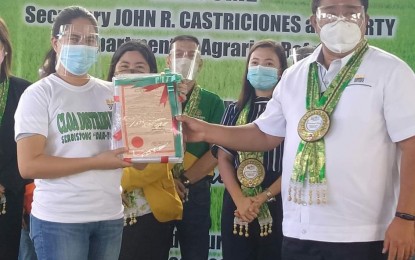
LAND DISTRIBUTION. Agrarian Reform Secretary John Castriciones (right) leads the distribution of land titles and support services to more than 1,000 Leyte farmers in Alang-alang town on Friday (Nov. 27, 2020). The Department of Agrarian Reform will issue an administrative order next week for the distribution of land to agriculture graduates and uniformed personnel retirees. (Photo courtesy of DAR)
TACLOBAN CITY – The Department of Agrarian Reform (DAR) is set to issue an administrative order next week for the distribution of land to agriculture graduates and retirees from government service, including uniformed personnel.
Secretary John Castriciones announced during his visit here Friday that he is set to sign the directive next week giving three hectares of land to each identified recipient.
He, however, did not give a specific date.
Giving land to agriculture graduates will help increase the number of young people who will take agriculture courses and parents who will encourage their children to take the course and engage in farming.
Castriciones noted that to strengthen the country’s economy, “we have to strengthen and improve our agriculture industry.”
“Our country produces many agriculture course graduates but the sad reality is that they cannot practice what they have learned after graduation because they don’t have their own land,” he said.
“So, I will be issuing an administrative order next week in relation to Section(s) 6, 7, and 14 of Republic Act (RA) 6657, so that all agriculture graduates will have their own piece of land, so they put into practice their wealth of experience and the knowledge they gain from their agricultural studies.”
RA 6657 refers to the Comprehensive Agrarian Reform Program (CARP) of 1988.
Castriciones said the government has more than 200,000 hectares of property classified as idle land, which will be certified for distribution to potential beneficiaries.
This is aside from the more than 500,000 hectares of land that will be distributed to CARP beneficiaries.
“That is good to give the agricultural graduates a parcel of land because they had been schooled purposely for agriculture, and even the retirees themselves from DAR, DENR (Department of Environment and Natural Resources) and DA (Department of Agriculture), employees who are mostly graduates of agriculture,” he said.
Castriciones noted that some of them even have a master’s degree and a doctorate.
“But the only problem is they don't have a piece of land that they can use as a laboratory in order to implement what they have learned and their experience as experts in agriculture,” he said.
Other than agriculture graduates, retiring or retired uniformed personnel from the Armed Forces of the Philippines and the Philippine National Police who are landless are also entitled to receive a portion from the government-owned idle lands, Castriciones said.
Under DAR Administrative Order 03 issued in 1997, landless war veterans, and veterans of military campaigns, their surviving spouses and orphans, retired AFP and PNP personnel, returnees, surrenderers, and similar beneficiaries will be considered in the disposition of agricultural lands of public domain.
Also included in AO 03 are members of the Citizen Armed Forces Geographical Units (CAFGUs) or their surviving spouses and orphans.
Rebel returnees are also included in this program, he said.
“As much as possible, we also would like to give them their own land because that is the reason why they rebel against the government – because of their economic difficulties. If we compel them to pay, where will they get the money for amortization? We might as well give them government-owned land so that they can benefit and enjoy the concept of social justice that is being addressed too under the CARP,” he said.
“Definitely, this will be a bold step in order to see to it that agriculture will really take the lead when it comes to the development of our country.”
Castriciones has been in Leyte since Thursday for a three-day visit, meeting with farmers and personnel of the regional DAR office and partner agencies.
He also led the ceremonial distribution of certificates of land ownership award (CLOA) during his second day of visit to 1,031 agrarian reform beneficiaries (ARB) from the towns of Alang-alang, Barugo, Burauen, Capoocan, Carigara, Dagami, Jaro, Kananga, and Pastrana.
Castriciones also led the launch of the Support for Parcelization of Lands for Individual Titling (SPLIT), a partnership program and funded by the World Bank worth PHP24 billion.
This project, which will be implemented over three years, seeks to improve land-tenure security and stabilize property rights by fast-tracking the land subdivision of collective CLOAs (CCLOA) and generating individual titles on lands awarded under the CARP.
Previously, CLOAs distributed to ARBs were issued through CCLOA, with one title but with a thousand or a few hundred beneficiaries.
This posed a problem because it did not specify which part of the land is owned by each ARB, according to the DAR. (PNA)
